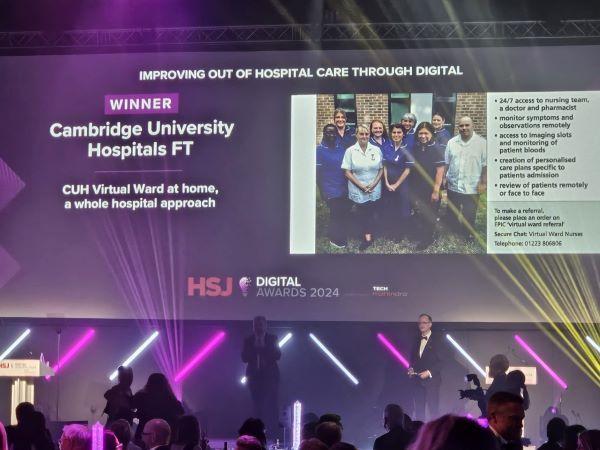Its innovative virtual ward, which has saved 6,000 hospital bed days, scooped the ‘Improving Out of Hospital Care through Digital’ title in the Health Service Journal Digital Awards, despite still competition.
The event was held at Manchester Central Convention Complex where more than 1,000 guests eagerly awaited the winners of 23 categories focussed on digital improvement.
The virtual ward was driven by programme lead, intensive care consultant Dr Iain Goodhart, lead nurse Gemma Czech, and operations manager Andy Bailey. supported by the Trust’s eHospital team, procurement and others.
Dr Goodhart said: “While we are absolutely delighted to receive this award, the real winners are the patients who benefit from all the advantages associated with this cutting-edge care.
“Staff have gone above and beyond this service and I am absolutely delighted their efforts have been recognised in these awards.”
The CUH virtual ward was established in 2022 and operates 24 hours a day, seven days a week, 365 days a year by a dedicated nursing and consultant team.
It treats patients recovering from a wide variety of medical and surgical conditions including respiratory, gastro and frailty conditions that can be safely managed remotely. It has achieved a 97 per cent positive patient experience and freed up more than 4,000 bed hours.
Patients on the virtual ward are monitored constantly by using smart phone apps, technology platforms and wearable medical devices, such as temperature readers and pulse oximeters
At the same time, a team of senior nurses check in with patients up to four times a day by phone or video call, with care also available face-to-face from multi-disciplinary teams.
If patients need further care, such as blood tests, scans or intravenous therapy, they can come into hospital for regular appointments or be visited in their own homes.
For patients, virtual wards mean they can leave hospital days or even weeks earlier, while still getting the expert care they need They can benefit from the comfort of their own surroundings, sleeping in their own bed, eating their own food, and being in the company of their family, friends and pets.
This often speeds up their recovery and reduces the risk of hospital acquired infections, with patients able to steadily return to daily routines and avoid deconditioning.
HSJ editor Alastair McLellan said: “The robust competition and entries from various regions and sectors underscore the widespread integration of technology in healthcare.”



